The compilation of evidence against 17 Black owner Yorgen Fenech, charged with complicity in the assassination of journalist Daphne Caruana Galizia, started this afternoon before Magistrate Rachel Montebello.
It was originally scheduled to be heard by Magistrate Nadine Lia, but she abstained from hearing the case after both the Caruana Galizia family as well as Yorgen Fenech objected to Lia hearing the case, arguing that she should abstain because she is the daughter-in law of Pawlu Lia, who has defended the Prime Minister in court on several occasions.
Fenech is charged with promoting, organising or financing a criminal association with the intention of committing criminal offences; with actively participating in criminal association; with being complicit in the voluntary murder of Daphne Caruana Galizia; with associating with persons in Malta or abroad with the intention committing a crime.
He is pleading not guilty.
Fenech is being assisted by Gianluca Caruana Curran and Marion Camilleri. The prosecution is led by Inspectors Keith Arnaud and Kurt Zahra.
Arnaud testified in the first part of the sitting, which lasted four and a half hours, with Melvin Theuma - the middleman who was granted immunity for providing details about the murder - testifying in the second part.
Follow the minute-by-minute reporting below
4.56pm: The sitting is adjourned. The case will continue on 19 December and 23 December, at 10am.
4.55pm: The court asks the prosecution to request the audio recordings, which are exhibited in the acts of a magisterial inquiry on money laundering, and present them as soon as possible.
4.52pm: The prosecution says the letter and the photo of Theuma and Schembri will be presented in court in the next sitting, by the inspector who conducted the search at Fenech's house.
4.48pm: The court assures the defence that the cross-examination will happen. Some of the evidence requested to be exhibited today could not be brought because it is still subject to an ongoing magisterial inquiry.
4.45pm: Defence lawyer Marion Camilleri is saying that the case, which will likely go to trial, could end up being prejudiced because the media could only report what the prosecution said today. The defence was not given the opportunity to cross-examine the witnesses.
4.40pm: Theuma's testimony is being suspended for the day. Fenech is again taken to the side while Theuma exits the courtroom.
4.30pm: Theuma is now describing how he would record his encounters with Yorgen Fenech. He also wrote a letter in which he mentoned Schembri. "I did this because I feared that Keith would help Yorgen lock me up." Asked how he had come to this conclusion, he said it was because "Keith and Yorgen were very good friends." He swears to the court, however, that the mastermind is Yorgen Fenech. "That is the only reason why I mentioned Keith in the letter. Because of their friendship. Otherwise, I have no reason to think that Schembri was involved in the murder."
4.20pm: One day, Theuma said he was visiting Johan Cremona and Kenneth Camilleri showed up. Camilleri produced a piece of paper with some phone numbers on it, one of which was Theuma's old number. When Theuma confirmed this was his old number, Camilleri told him "so you are the mastermind." Theuma replied that the mastermind was Yorgen Fenech. "I felt that this was when the betrayal started," he says. Yorgen Fenech later told him that Schembri had sent Camilleri "because of me, because he [Schembri] would run through fire for me."
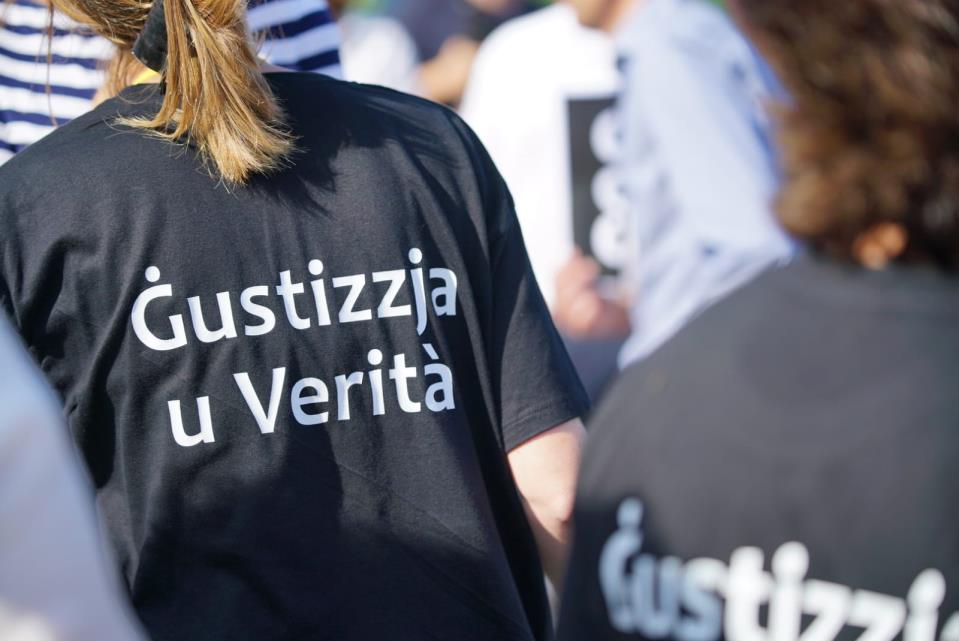
4.15pm: Kenneth Camilleri told Melvin Theuma to tell the Degiorgios that they would be released on bail on the 22nd (December), at 1 million euro each. The 22nd went by, but they were not released and no money was sent. Theuma said he went to Fenech and told him he was in trouble because he had promised the Degiorgios that they would be released on bail and be given the money but this did not happen. Fenech did not want to take responsibility for this, saying he did not know anything about the promise. Theuma told Fenech that, if Camilleri had been sent by Schembri, he would take Mario Degorgio to his (Schembri's) Mellieha house so that Schembri could explain to him.
4.12pm: An argument ensues over the prosecution's line of questioning, and both sides are reprimanded by the magistrate, who warns them that she will find them to be in contempt of court and fine them if there are any more interruptions or shouting.
4.09pm: The magistrate asks Theuma how he assumed that the visit by Camilleri and Cremona was related to the case. "What else would they have come for?" Theuma replies. "I assumed they came because of the argument I had just had with Fenech."
4.05pm: At one point, Fenech told Theuma that Vince Muscat was telling the police where the bomb had been manufactured, Melvin Theuma tells the court. That evening, Theuma received a call from a friend, Johan Cremona, who wanted to visit him. Cremona went to Theuma's home with Kenneth Camilleri, who Theuma knew worked with the police traffic section and at Castille. Theuma immediately thought that Camilleri had been sent by Fenech or Keith Schembri. Camilleri asked him what was going on, and Theuma started telling him that he was concerned about Vince Muscat talking to the police.
4.01pm: "If Yorgen killed me he would be relaxed," Melvin Theuma said, as Fenech, sitting in the dock, shook his head and gestured towards his lawyers, clearly not impressed with what the witness was saying.
3.58pm: The Degiorgios, through Mario, demanded 30k for the lawyers. Theuma told them that he could not keep asking Fenech for money for he feared that he would end up dead like Daphne. The message that came back from George Degiorgio was that he "should fear us who are on the inside, not those outside, because we are the ones who know your name."

3.54pm: Theuma says he eventually started sending the suspects money and other items through Mario Degiorgio. "I would send them rabbits, maybe a rib-eye," he says, adding that he wanted to keep them happy. He says he became deeply depressed and had considered jumpng off the roof. He feared going to prison and losing everything. "Now I feel much better that that I got this off my chest."
3.44pm: Theuma says after the raid he started drinking whiskey and taking anti-depressants. He says he was distressed and feared that the suspects would tell on him with the police. He explains how he would make sure that money reached the suspects when they were in custody. He sent them 300 euro a week, but Fenech never refunded him for this money.
3.39pm: One day, Theuma said he met Fenech in Zebbug. Fenech told him that the suspects were in trouble because the police were on to them. Theuma says he never asked Fenech where he was getting his information about the police movements. Fenech later informed him about an impending big police raid and he (Theuma) warned the suspects. Fenech had told him the raid would be carried out on 5 December (in reality, it was carried out the day before, on 4 December)
3.35pm: The day after the murder Theuma said he was very worried and asked to see Fenech. Fenech tried to calm him down, telling him that the Maltese police "are no FBI." That week he went to see Alfred Degiorgio in Marsa. Alfred told him that, apart from the remaining 120k he wanted an additional 5k to cover equipment expenses.
3.33pm: "I did not even know where I worked," Theuma says, as his continues testifying. He says he sat for an interview and was sent to Jobsplus to fill some applications. "To this very day I have no idea what the job was." He received four or five cheques, after which he was sacked.
3.30pm: The defence has raised an objection, saying that any evidence the witness mentions should be exhibited in court.
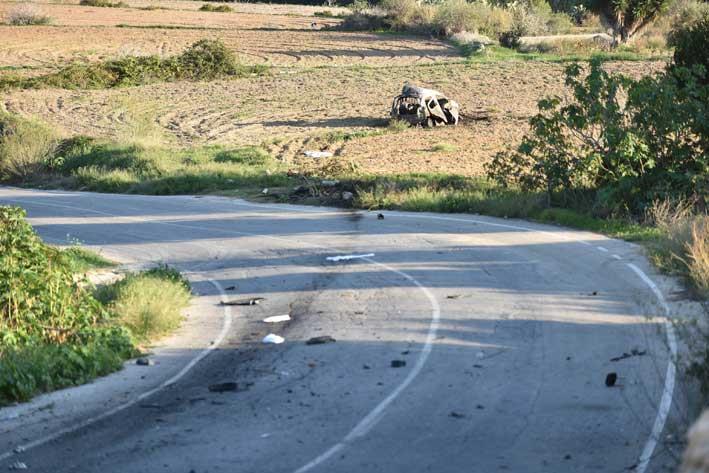
3.25pm: Two days after Fenech told Theuma to speak to Degiorgio for the first time, he told Theuma that he would receive a call from Sandro Craus at the Office of the Prime Minister. Fenech did not tell him what the call was for, Theuma says. Craus called Theuma and told him he had an appointment with Keith Schembri the following day. Keith Schembri was waiting for him on the staircase. He showed him around Castille and later took him for coffee. Craus later told Theuma he would be given a job. Theuma told them he did not need one but Craus "insisted" that they would give him one. Craus told him "you won't actually be going to work." Sandro Craus took the photo of Theuma and Schembri together on Theuma's phone. He says there was one copy of the photo with the recordings, and another one he gave to Fenech.
3.22pm: An argument erupts in the courtroom, with the defence saying that Inspector Arnaud is making direct questions and suggesting what the witness should say.
3.14pm: Theuma says Yorgen started hassling him to ask the Degiorgios when they would kill the journalist, saying he was worried that she would publish information about him (Fenech). On one occasion, he met George Degiorgio and Vince Muscat in Marsa. Degorgio told him the murder plan was troubling them but "if so many bullies have died, so will she." Alfred once took him to the Bidnija lookout point to show him that they were working on it. He then asked Theuma what restaurants Daphne went to, and Theuma got this information from Yorgen Fenech.
3.10pm: Two weeks later, Theuma said he drove Fenech to the airport. Fenech produced a thick brown envelope containing 150k euro in 50 euro notes. When asked what the money was, Fenech told him it was for the murder. Theuma then went to Busy Bee with Alfred Degiorgio and gave him the 30,000 euro downpayment. Theuma says he did not know anything about the murder, such as the date or method. Alfred once told him they had been "unlucky" because their plan had been disrupted by an unexpected police roadblock. All communication was made through Whatsapp or Signal, "so that the calls would not be overheard", Theuma tells the court.
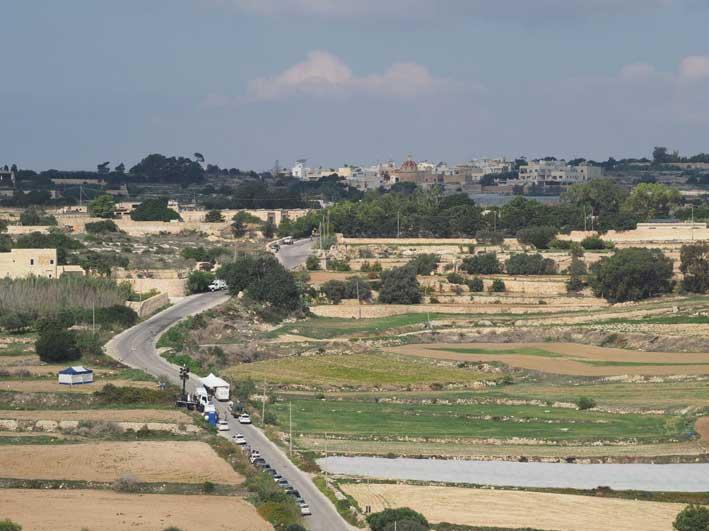
3.06pm: Theuma says Fenech later told him to suspend the plan. Theuma went to inform the Degiorgios, giving him 1,500 because he did not want to look bad with him. Theuma gambled some 150,000 euro for Fenech on the election. Fenech had bet on the Labour Party and won. On the day the PL won the election, Fenech called him and told him the plan was back on. Theuma, having noticed that Fenech had been drinking, did not go to Degiorgio.
3.02pm: Theuma said one day Fenech asked to meet him near the Blue Elephant. Fenech asked him to get the contact of Alfred Degiorgio. He wanted to kill Daphne because she was working on a story on his uncle, Ray. This was three weeks before the 2017 election was announced. "I called Darren Debono 'it-topo' and asked if he had 'il-Fulu's number", he says, adding that Debono later sent him the number. He called Debono because he knew that he knew the Degiorgios. He met Degiorgio and told him "I have someone who wants Daphne killed." Degiorgio asked if this person would pay, to which Theuma replied "I wouldn't be here otherwise." The first meeting with Degiorgio was held at the potato shed. They then met at the Busy Bee, where Theuma had an espresso and Degiorgio had an orange juice. Degiorgio demanded 150,000 euro, with 30,000 being paid upfront.
2.59pm: Melvin Theuma says he had a very good relationship with Fenech. "We were friends. We would go abroad together and he would invite me to his house." The last time we went abroad together was when my son was operated.
2.55pm: Melvin Theuma says he has been working as a taxi driver for seven years and has two taxis. He used to be based at the Hilton "because Mr (Yorgen) Fenech allowed me." He first knew Ray Fenech, Yorgen's uncle, but later got to know Yorgen through betting on horse races. He had rented Fenech a shop in Qormi, which was used by Bestplay. He says the Portomaso taxi stand is very good business since there are fewer drivers.
2.53pm: Middleman Melvin Theuma enters the courtoom. Yorgen Fenech is led to one side of the courtroom by the guards, not allowing the men to get close to each other. The magistrate is cautioning him, saying that he has to tell the truth. If he does not, his immunity may be withdrawn.
2.47pm: The court says that Theuma will not be allowed to testify on the recordings today.
2.44pm: Melvin Theuma, the middleman who was granted presidential pardon, is set to testify. The defence is again arguing that the recordings should be heard because Melvin Theuma, who will be up on the witness stand next, will obviously be asked about them.

Melvin Theuma (right) escorted by the police
2.41pm: The court has denied the defence's request, accepting the suspension of Arnaud's testimony.
2.36pm: The defence is also asking why the inspector is suspending his testimony, to which Arnaud replies that there is much more information to be given and that there is a civilian witness who needs to testify.
2.32pm: Deputy AG Philip Galea Farrugia objects to the request. The original copies are held by Europol and will be exhibited at a later stage, he says, adding that exhibiting an informal copy has no value at this stage.
2.27pm: The inspector says he is suspending his testimony and will continue in the next sitting. The defence says it wants to cross-examine the witness today. Lawyers Marion Camilleri and Gianluca Caruana Curran say the recordings should be presented since so much of today's testimony made reference to them. A few minutes earlier, the inspector had said the recordings would be presented in the coming days. The lawyers want the recordings to be heard today. "The inspector told us what he understood from the recordings and the conclusions they drew from them. We would like to hear these recordings to see what results from these recordings as a fact," the defence argues.
2.20pm: Theuma was granted a pardon on 25 November after his information was corroborated by the investigators. In the meantime, Fenech made a second request for a pardon, saying he wanted to change the reasons why he wanted a pardon. The defence objected, and, replying to the magistrate, Arnaud says these conversations were not recorded because they were informal. The investigations continued on the basis of what Fenech said during these informal discussions, which led to other people being arrested and questioned, Arnaud says.
2.14pm: The police spoke to Fenech twice before Theuma's pardon was granted, Arnaud says. Fenech spoke in a confidential manner, telling officers that he was only speaking to them to get a presidential pardon. "I cannot say much of what was said there," Arnaud says. Fenech was questioned on Theuma's letter, the recordings and any involvement by Keith Schembri.
2.10pm: Theuma said he had never personally asked Schembri for bail for the accused. Arnaud is now speaking about the letter written by Theuma, which was found at Fenech's home, and in which Theuma says Fenech and Schembri were plotting to eliminate him. Asked why he mentioned Fenech and Schembri in the letter, Theuma said he had become convinced that Fenech was plotting to kill him, since he was the only one who knew Fenech's name. He was also suspecting that Schembri, working with Fenech, would do something to him, possibly throwing him in prison. There was only one copy of the letter, which Theuma had given to Fenech. He gave it to him to show him that Fenech would not be solving the problem by killing him (Theuma) as he was willing to speak and had other evidence linking Fenech to the case.
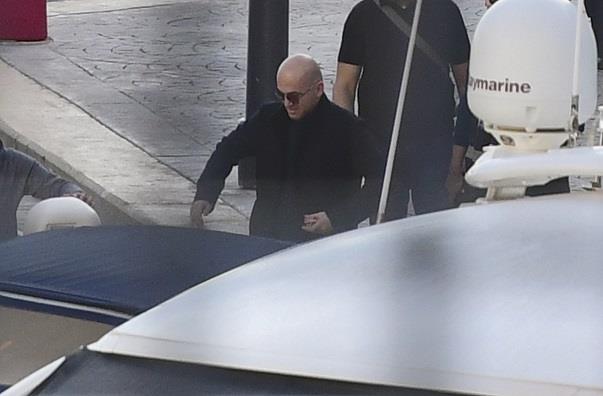
Yorgen Fenech near the yacht where he was caught on 20 November
2.05pm: Theuma always said he suspected Schembri was involved because he was Camilleri's superior and because he was aware of Schembri and Fenech's friendship, Arnaud tells the court. Theuma said he only met Schembri twice, once at Fenech's ranch, where they shook hands, and the second time at Castille, when they had a photo taken. Keith gave him a tour of Castille and took him for a coffee. He then passed him on to Sandro Craus, who gave him the job. Theuma told people at the OPM that he did not need the job because he was a taxi driver, but the cheques started coming anyway.
2.04pm: Theuma said during questioning that he always dealt with Fenech. The latter would give him a minimum of 2,000 a week to pass on to the Degiorgios, Arnaud says. The police spoke to Kenneth Camilleri, who claimed he had been approached by Theuma to request bail and asked him to speak to Schembri. Camilleri said he told him to leave it to him but did this only to get rid of Theuma.
1.59pm: In another part, Fenech Tells Theuma that once he set out do to something, he would do it well, and did not want anything to happen to Theuma.
1.56pm: Yorgen Fenech said Keith Schembri had become involved because he had respect for him (Fenech), Arnaud tells the court. Fenech told Theuma that Schembri went cold when he (Fenech) told him (Schembri) about the case. Schembri replied that he would help him. "Xi tridni naghmel, mhux nghinek?" Fenech told Theuma that he and Schembri were friends and he had no option but to tell him about everything. Fenech told Theuma he would ask Schembri again about bail. "He will only say what he always says, that he has no power over the matter," Fenech told Theuma. In another part of the recording, Fenech says Schembri told him "you should have come to me earlier."
1.53pm: Fenech, at one point, told Theuma about a meeting the police had had with the Prime MInister and Justice Minister Owen Bonnici about the murder sometime in 2018. Arnaud says he had attended that meeting, along with former deputy commissioner Silvio Valletta. Theuma did not know who Kenneth Camilleri was, and thought he might have been the PM's driver. Fenech told him that this was not the case. Fenech told Theuma that Keith Schembri denied having sent Camilleri to speak to Theuma about bail.

Prime Minister Joseph Muscat and Justice Minister Owen Bonnici
1.47pm: In the conversation Fenech was also heard telling Theuma that he had given him the 150,000 euro up front. In the recordings they also spoke of the money Theuma was passing on to the Degiorgios in prison through their brother, Mario. In other recordings, Fenech told Theuma he did not believe Keith Schembri had the power to intervene on bail for the three suspects.
1.43pm: Fenech told Theuma he would speak to Keith Schembri to see why he had promised him that the Degiorgios would be relesed on bail. He is heard telling Theuma that, if Schembri promised such a thing, he did wrong. In the Portomaso recording, Theuma told Fenech informed Fenech that he had been recording him. Fenech was disappointed. He told Fenech that he was concerned because the suspects knew him, not Fenech. "I never mentioned your name with them," Theuma told Fenech. Theuma again raised the bail issue, mentioning Kenneth Camilleri again. "He was uncomfortable and seemed intent on insisting that the suspects should be given bail. He had told the suspects that they would be released and did not want to disappoint them," Arnaud says. Fenech was telling Theuma that there was nothing he could do about the bail, to which Theuma said he was willing to speak to the Prime Minister. Fenech told him not to do that as it will get more complicated.
1.40pm: A common thing in all three recordings is Theuma's insistence that the Degiorgios should be given bail. He said that Kenneth Camilleri had given him the impression that they would be given bail on the 22nd. Theuma first told Fenech that Schembri had promised bail but later said Kenneth Camilleri had told him this, and he suspected Camilleri had been sent by Schembri. It is clear in the recordings that Fenech was unaware that someone had approached Theuma and told him about the bail, Arnaud says. Fenech is sitting attentively in the dock.
1.37pm: The police focused on three particular recordings out of the lot, Arnaud said. One of them was recorded at Portomaso. Theuma had told some of his associates that he was going there to record Fenech. "We understood from the recording that he entered Portomaso, spoke to a receptionist and then went up to speak to Fenech." Another recording seems to show that Theuma picked up Fenech and his children from the airport. Only Theuma and Fenech are heard speaking in the recording.
1.33pm: The devices included multiple copies of the same recordings, Arnaud said. The police started understanding what the conversations between Theuma and Yorgen Fenech were about. Police have no information linking Theuma to any other person. He would always go from Fenech to Mario Degiorgio. In one recording, of an argument between Fenech and Theuma, the latter mentioned "your friend Keith Schembri" to Fenech. This was the only time Schembri's name cropped up in the recordings.

Former OPM chief of staff Keith Schembri
1.29pm: During the questioning, Theuma said he wanted to speak about Daphne's murder. He was very emotional and started crying. His lawyers, Matthew Brincat and Kathleen Grima, said he was willing to talk but was requesting a presidential pardon. The Police Commissioner and the Attorney General informed the Prime Minister, who gave them the go-ahead as long as the information would lead to the arrest of the mastermind. The agreement bound Theuma to provide all information he had, including what he had done after the suspects' arraignment. When the agreement was signed, Theuma was questioned over the span of a week by Inspectors Arnaud and Zahra.
1.25pm: Melvin Theuma was arrested on 14 November, early in the morning, Arnaud says. Some of his relatives were also arested in the ECU operation. He was carrying a sealed plastic box and told officers that he wanted to open it in the presence of the police commissioner. Later that evening, the police, the inquiring magistrate, Theuma and his lawyers were summoned to the police HQ, where he was asked to unseal the box. The process was filmed. Inside the box, there were three mobile phones, three USB drivers, a voice recorder and two packs of photos showing a mobile phone laid out on a table and with messages from a 'Yorgen' displayed on its screen. There was also a photo of Melvin Theuma with Keith Schembri. This was a colour photo. The devices were handed over to Europol to extract the data. They were provided with a base and started working on the extraction right away.
1.21pm: The inquiring magistrate, Neville Camilleri, was kept informed on all developments related to Melvin Theuma, Arnaud says. They discussed with Europol the way forward with regard to Melvin Theuma. Investigators wanted to find these recordings. This was around April of this year. Investigators saw that Theuma was heavily involved in gambling and was also possibly involved in money laundering activity. Within a few months, they concluded that there was a strong case against Theuma on illegal betting and money laundering. Arnaud says he was not directly involved in this operation but liaised with the officers who were.

1.17pm Melvin Theuma (above) worked as a taxi driver and was based at Portomaso. Theuma's character changed after the murder. Even his friends said he seemed very concerned about something. At one point, he had an argument with a person, who was later identified as Yorgen Fenech. Theuma had been recording his conversations with Fenech. At this stage the police did not know what the content of the recordings was or whether it was in any way connected to the murder. It later transpired that the recordings were indeed related to the murder and there were also mentions of bail for the Degiorgio brothers.
1.13pm: The police received "very confidential" information on Theuma's role in the murder, Arnaud says. They were told that he was the middleman but the person who contacted the police did not say who the mastermind was. He told them, however, Theuma had passed on 150,000 euro to the suspects for the murder. From the information gathered, it was clear that Melvin Theuma was the only person acting as a middleman.
1.11pm: On one occasion, they said they were worried because VInce Muscat was offering to speak to the police, Arnaud says. Mario told them that "he" had also told him that Muscat had spoken to the police. He was telling them to be careful. George asked Mario whether he had got the information from the one whose name starts with an "M" and Mario confirmed that it was. At a later stage, Degiorgio's partner was charged with money laundering. The 15,000 euro needed for bail were paid for by Melvin Theuma.
1.08pm: The following day, George called Mario, who passed him on to someone else. The police suspect this was Melvin Theuma. The man was telling George to keep strong and that they would meet again. The police later confirmed that George had spoken to Theuma. It was established that Mario would act as the go-between, between Theuma and the Degiorgio brothers. The police, listening to the calls, established that Mario Degiorgio would often be at home when his brother George called him. They established this from background noise and because Mario's wife would sometimes speak to George. Mario would tell his brother that he would be taking him meat, "sriedaq", gbejniet and other items. Melvin's name was never mentioned in the phone calls but the Degiorgio suspects would often ask their brother outside to go meet with "him."
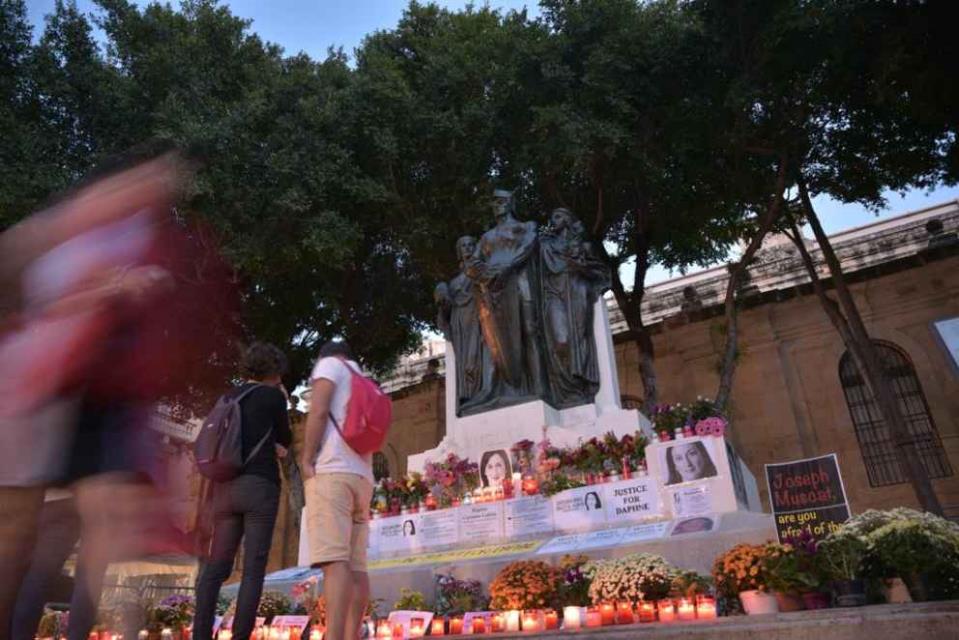
1.07pm: The task force remained in place for the next two years, to establish whether the suspects had been commissioned to carry out the crime. Police monitored their calls from inside prison, Arnaud said. Muscat always communicated with his family. But there was something irregular in the case of George Degiorgio, who would call his brother Mario and ask him whether he had met with "him." This happened between January and March 2018. On 21 March, in a call between George and Mario Degiorgio, where the latter told George to call the following day at 9.45 because "someone wants to speak to you."
1.03pm: The suspects had refused to answer questions when the police tried to take a statement from them. Investigators monitored the suspects' movements inside prison after their arraignment, Arnaud said. Europol were still assisting the Maltese police to analyse the data collected over a number of months.
1.01pm: In the meantime, forensic experts confirmed that the cigarette butt had DNA matching that of Alfred Degiorgio, Arnaud says. Alfred Degiorgio was making use of a rental car, which had been seen on a number occasions near the area where the cigarette butt was found.
12.59pm: Alfred Degiorgio's phone was found discarded on the ground a few metres away from where he was arrested. A search of the seabed was conducted, with investigators finding an old phone belonging to George Degiorgio and one belonging to Vince Muscat. They also found one of the 'ghost' phones police suspect was used by George Degiorgio. There were three ghost phones, none of which was used again after the explosion.
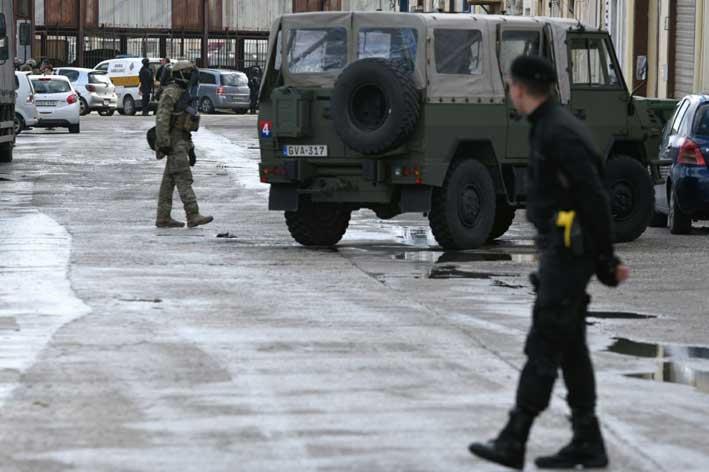
AFM vehicles outside the Marsa potato shed where three men accused with the murder of Daphne Caruana Galizia were arrested
12.57pm: Three people were arrested at the potato shed on 4 December 2017. Inspectors Arnaud and Zahra, together with foreign experts, searched for evidence inside the shed. The searches were carried out in the presence of the three suspects, the Degiorgio brothers and Vince Muscat.
12.54pm: At around 14.50, this mobile phone was connected to a cell tower in the Grand Harbour. We began suspecting that the person who detonated the bomb was on a boat out at sea, Arnaud says. The police knew that the suspects owned boats and had photos of them. They went through port CCTV footage, finding that the Maya, registered to Alfred Degiorgio, was below the Great Siege Bell at the time the bomb was detonated. It then sailed back to the potato shed in Marsa. The police gathered more intelligence on the suspects before making the arrests. Eventually, arrest warrants were issued against the Degiorgios and other people who the police deemed to be 'of interest.'
12.51pm: The FBI was the agency that gathered this data and the Maltese police linked one of the numbers to one of the people who was later arrested in connection with the case, Arnaud says. The person was known to frequent the Marsa area. The first two people identified were Alfred and George Degiorgio. Data from George's phone showed that his personal device and one of the devices used in the murder were kept close to each other, indicating that they were being carried by the same person. The message that detonated the bomb was sent at 14.58pm. The SIM used to send this message was taken out to sea, with the vessel travelling up and down the coast.
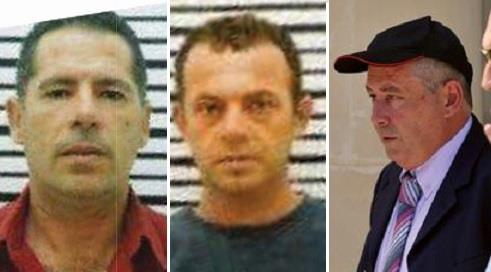
Alfred Degiorgio, George Degiorgio and Vince Muscat - the three men accused of murdering Daphne Caruana Galizia
12.48pm: The police identified three other mobile numbers that were activated at around August 2017, and went off shortly before the explosion, Inspector Keith Arnaud says. A pattern emerged of how these phones were used and where they were taken on the day of the explosion. Data showed that one of the phones was frequently located in Bidnija. The SIM card found in the bomb was only taken to Bidnija on the day of the murder. It was activated on the night before, and did not show any movement.
12.46pm: Police spoke to owner of the garage that had leased the car to Daphne Caruana Galizia to see if a spare key could have been acquired by third persons but concluded that this was not the case, Arnaud says. The sim cards used in the bomb and mobile phone used to detonate it were bought late in 2016. The SMS was sent at the exact same time the bomb went off, confirming the thesis that it was used to detonate the device.
12.44pm: Investigators understood within days that the car was blown up by a bomb. Experts concluded that it had been placed under the driver's seat. Data from cell towers showed identified two mobile numbers, one of which sent an SMS to the other at the time of the explosion. The SMS that activated the bomb's circuit was later decoded, Arnaud says. Police spoke to people living near Tat-Targa battery who said they had seen suspicious individuals in the area. Investigators elevated a cigarette butt from an area overlooking Daphne's house.
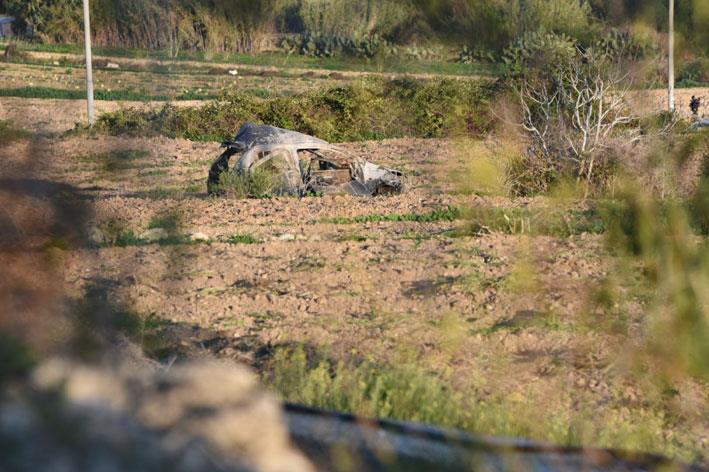
12.42pm: Inspector Arnaud says Inspector Zahra was tasked with leading the field investigation and speaking to people in connection with the case while he liased with foreign investigators looking into cellular data. He also worked with Europol experts who supported the investigation. Some of them were later appointed as court experts to extract devices elevated as part of the investigation. Dutch experts assisted the Maltese forensic experts and combed the scene of the crime and the surrounding area.
12.39pm: Inspector Keith Arnaud takes the stand. He says the case started on 16 October 2017, when he was informed, at around 3.30pm that a car had exploded in Bidnija. Some of his colleagues were already on the scene investigating. A Peugeot 108, which was being driven out of Bidnija by Daphne Caruana Galizia, was blown up a few metres away from her home.
12.37pm: Magistrate Rachel Montebello enters the courtroom.
12.36pm: Daphne's husband Peter Caruana Galizia is sitting near the prosecutor, and lawyer Therese Comodini Cachia, who is assisting the family.
12.35pm: Fenech is sitting quietly, wearing a dark suit. There are five heavily armed prison guards in the courtroom.
12.34pm: Inspectors Keith Arnaud and Kurt Zahra have arrived.
12.33pm: The courtroom has opened.
12.27pm: Fenech's other lawyer, Marion Camilleri, also arrives.
12.23pm: Yorgen Fenech brought into the court room, escorted by five officers from the Corradino Correctional Facility.
12.18pm: Fenech's lawyer Gianluca Caruana Curran is present.
12.15pm: Daphne's parents Michael and Rose Marie have arrived.